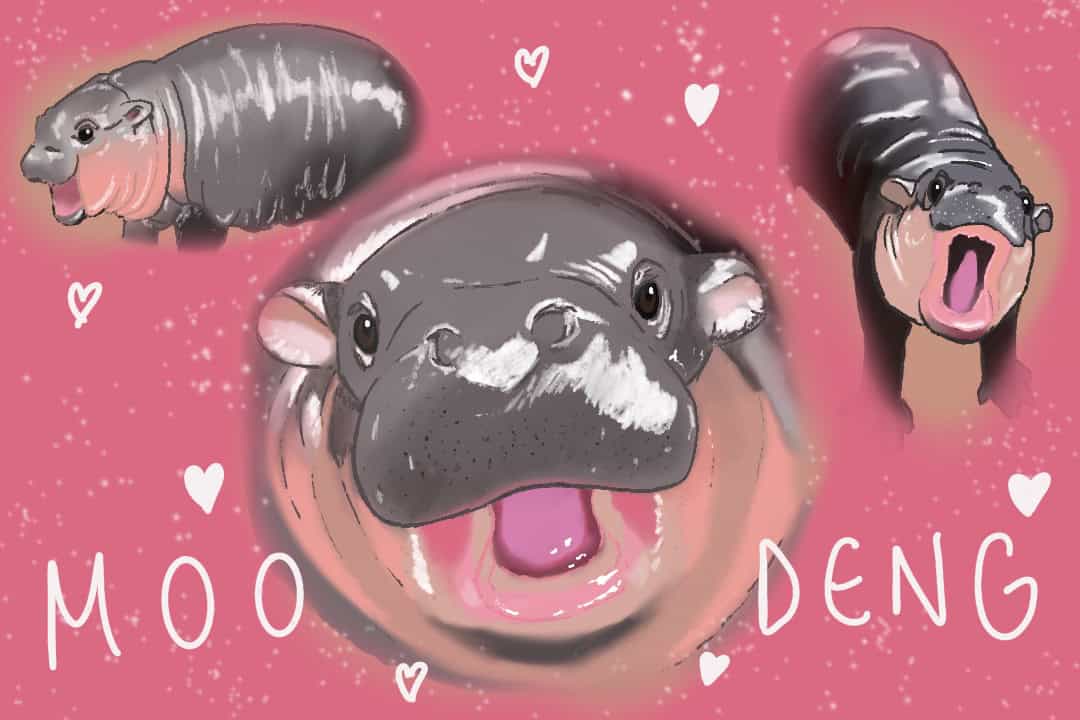It is not lost on me that internet sensation Moo Deng, the baby pygmy hippo, already lives inside a zoo enclosure.The perfect pedestal from which onlookers so possessed by her cuteness can gawk, heckle, and harass her so much that they’ve confessed to wanting to ball her up and swallow her whole. After all, her name translates to “bouncy pork.” Pygmy hippos are not native to Southeast Asia, so how did Moo Deng and her mom Jona, end up in Chon Buri, Thailand? There’s an overlooked narrative at play here, one in which Moo Deng is the central spectacle in a discussion between conservation and exploitation.
Our collective cultural obsession with Moo Deng exemplifies the bizarre relationship humans have with animals paraded in enclosures for our entertainment. With other examples of this being Pesto the Penguin and Harambe the Gorilla, Moo Deng’s fame doesn’t come as a coincidence. Her zookeeper, Atthapon Nundee, spent years cultivating the online presence of animals at Khao Kheow Open Zoo. Moo Deng’s rapid rise as an internet star surprised everyone, but that was the plan all along.
First, let’s address the fact that Moo Deng and Jona, her mother, are zoo animals kept in Thailand — a country far from the forests of West Africa where pygmy hippos originate. Their ancestors were likely part of a zoo exchange or breeding program, a common practice in wildlife conservation aimed at increasing the survival and population of endangered species that may struggle in the wild due to habitat deterioration.
However, while zoos often frame this as part of a broader conservation effort, it raises ethical questions about the displacement of wild animals from their natural habitats for human entertainment. Pygmy hippos are critically endangered, with fewer than 3,000 remaining in their natural environment, largely due to habitat destruction, mining, and illegal hunting.
Seeing Moo Deng should inspire awe and a sense of rarity since, in the wild, pygmy hippos are quite camera-shy. However, it should also prompt reflection on how this spectacle is only possible in a controlled, artificial environment.
While marketed as a conservation effort, Moo Deng’s zoo presence also draws crowds. As Khao Kheow Open Zoo director Narongwit Chodchoy said in an interview with The Independent, “Normally on weekdays and in the rainy season — which is a low season — we’d be getting around 800 visitors each day,” but lately, that number has soared to 20,000 during weekends due to Moo Deng’s recent internet fame. Just imagine that many people sticking their cellphones in your face, eager to take pictures and make you the next internet meme. On the bright side, the zoo uses Moo Deng’s image to raise more funds for its conservation and breeding programs. As Chodchoy stated to The Associated Press, “After we do this, we will have more income to support activities that will make the animals’ lives better.”
However, our fascination with Moo Deng isn’t just about her cuteness; it is tied to our collective desire to engage with animals in ways that are, frankly, voyeuristic. Moo Deng becomes an object of human consumption — not just in the figurative sense of viral media, but almost literally, with people discussing her cuteness, her slippery flesh, and her “endless” body rolls as if she is food to be devoured.
Then there is our insatiable desire for “nice things” and constant entertainment, which has driven visitors to throw objects at Moo Deng while she naps. In an interview with NowToronto, U of T anthropology professor Laura Bolt said, “It is very problematic that zoo visitors have thrown shells at Moo Deng and sprayed her with water because they want her to be active during their visit.”
Pygmy hippos are naturally both nocturnal and secretive, so I wonder if being surrounded by noisy crowds negatively impacts her development. In some ways, Moo Deng has been reduced to a circus animal performance, with zoo visitors documenting every instance of her swimming, eating, biting, and falling — turning a sentient animal into a spectacle. The zoo has responded by installing security cameras and limiting visitor time to avoid further harassment.
Pygmy hippo populations are so small, and their habitats so fragmented by tree logging that researchers struggle to study them at all. Bolt added, “On one hand, it’s always a good thing when a particularly charismatic animal makes the general public more interested in a threatened species… on the other hand, many of the viral videos of Moo Deng show human-hippo interactions — like Moo Deng chewing on the knees of the zookeeper caring for her — which can lead to misconceptions about the natural behaviour of pygmy hippos in wild settings.”
Our fascination with Moo Deng reveals much about the contradictions inherent in human-animal relationships. “As we learn more about the intelligence and emotional lives of animals, it becomes increasingly difficult to justify keeping them in captivity.” Harambe’s tragic death in 2016 is a stark reminder of what happens when wild animals, confined for our entertainment, are forced into unnatural environments. We want to protect yet we exploit; we want to connect yet objectify. Overall, Moo Deng’s story is part of a much larger narrative about wildlife conservation, captivity, and the commodification of nature.



No comments to display.